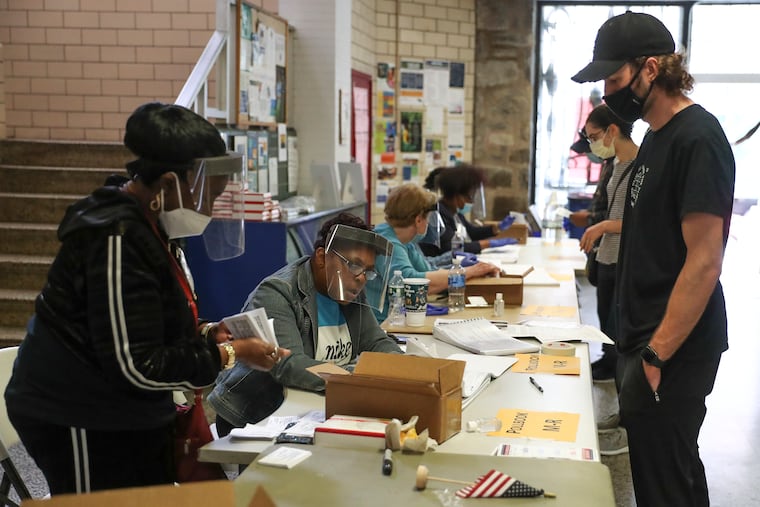In 2020, we cheered for poll workers, so why aren’t they now prioritized for vaccines ahead of the primary? | Opinion
Vaccinate poll workers now.

On Tuesday, May 18, the voters of Pennsylvania will again take to the polls to determine the outcomes of the municipal primary elections. On the ballot at every voting division this year are your neighbors, the local election officials whose job it is to set up the polling places, greet and sign voters in, ensure smooth election operations, and tend to the voting machines that collect and tally the votes. Poll workers are a crucial cog in the gears of our democracy, and in Pennsylvania, every four years — including 2021 — many have the unique task of overseeing (among other offices) their own reelection. It’s crucial that they are able to do it as safely as possible, and this year that means making sure all election workers who choose to be are fully vaccinated by Election Day.
2020 was an enormous logistical challenge for election staffers. In Philadelphia alone, thousands of the nearly 8,500 elected and appointed poll workers opted out of serving in the spring and fall due to fears of coronavirus infection. The population of poll workers across the city has historically skewed older, and many of our most dedicated and longest-serving election officials were, demographically speaking, also those with the highest chance of adverse outcomes from contracting COVID-19. Many thousands of volunteers admirably stepped up as replacement poll workers when they were needed. Many of those plan to assist again in May, and have also thrown their names into the ring to be elected to their jobs.
» READ MORE: Pennsylvania had more poll workers than it could handle last year. Where’d they go?
As of now in Philadelphia, poll workers are not classified as essential workers for the purposes of COVID-19 vaccine priority. We’re not classified as anything. Presumably, many of the older and health-challenged election workers, who will have already qualified for the city’s 1A and 1B classifications, will have managed to procure vaccines by Election Day, but last year’s retirements and opt-outs, along with the volunteer influx, have left a poll worker corps that is paradoxically both younger and healthier on the whole than it was before last year, yet also less likely to be currently eligible for COVID-19 vaccines.
Polling places across Philadelphia vary wildly by size, type, and ventilation. Some are high school gyms, some are church basements, or hair salons, or garages. The spaces are often cramped, especially with a full election board, two or three voting machines, and a room full of voters. The city commissioners did a good job of providing personal protective equipment for poll workers in November, and there’s no reason to think that won’t continue, but shepherding a few hundred Election Day voters of unknown health status through the process of pens, books, and machines constitutes a clear risk, regardless of safety equipment.
» READ MORE: Should local election boards be nonpartisan? | Pro/Con
New Jersey, laudably, has included poll workers in its list of vaccine-eligible workers since mid-February. The commonwealth (everywhere but Philadelphia) now includes county election workers in its 1C classification, eligible for vaccination starting April 12. In the city, we’re not even on the list.
The election is in six weeks. Two-shot vaccine immunity takes five or six weeks. The math isn’t complicated; it points to now.
Ryan Godfrey is a software engineer. He has served as an inspector or judge of election in Cedar Park since 2013.